(Photo
by
Aude
Guerrucci-Pool/Getty
Images)
Clarence
Thomas
failed
to
show
up
to
this
morning’s
Supreme
Court
session,
depriving
the
advocates
of
any
questions
that
he
would
inevitably
not
ask
anyway.
It’s
a
shame,
because
Thomas
missed
out
on
Snyder
v.
U.S.,
a
case
about
whether
or
not
it’s
bribery
to
funnel
payments
to
an
official
“in
recognition
of
actions
a
state
or
local
official
has
already
taken
or
committed
to
take,
without
any
quid
pro
quo
agreement
to
take
those
actions.”
Just
seems
like
a
subject
Thomas
might
have
thoughts
on,
that’s
all.
According
to
CNN,
the
Supreme
Court
did
not
respond
to
a
request
for
additional
information
about
Thomas’s
whereabouts.
The
most
obvious
excuse
would
be
an
illness.
That
was
the
basis
of
his
past
absences.
Though
if
the
justice
has
the
sniffles,
one
would
expect
the
Court
to
just
go
ahead
and
say
so
in
order
to
tamp
down
on
reckless
speculation
—
already
seeping
onto
social
media
—
that
Biden
is
going
to
end
up
making
a
Supreme
Court
nomination
this
year.
And
while
it’s
possible
that
Thomas
skipped
out
on
his
job
because
he
couldn’t
find
parking
—
he
does
drive
an
RV
financed
by
a
rich
health
care
executive
and
those
are
a
bear
to
back
into
a
slot
—
let’s
go
ahead
and
assume
that’s
not
the
case.
Perhaps
he
had
to
do
a
little
testifying
of
his
own
this
morning
in
the
probe
into
an
unnamed
judge’s
illegal
financial
disclosure
omissions
that
we’re
all
pretty
positive
is
him.
Maybe
most
plausibly,
he
took
a
look
at
a
case
about
whether
or
not
it
should
be
a
crime
to
give
an
official
money
for
past
actions
in
a
world
where
ProPublica
has
tagged
the
justice
with
telling
GOP
lawmakers
to
make
sure
the
justices
get
more
money
or
one
or
more
of
the
reliable
ones
—
like
you
know
who
—
might
quit
and
then
he
suddenly
started
getting
all
kinds
of
gifts
that
he
refused
to
disclose
and
thought…
yeah
I
don’t
want
my
name
hitched
to
this
case.
Though
if
he’d
recused
himself
formally
the
Court
would
have
to
disclose
that
because
the
Supreme
Court’s
SUPER
DUPER
NEW
ETHICS
CODE
requires
the
justices
to
disclose
why
they’ve
recused
themselves.
And
it’s
not
like
one
of
the
justices
would
just
ignore
that
basic
standard
of
ethical
behavior.
On
the
other
hand,
maybe
Thomas
lacks
Alito’s
brazenness
for
flouting
the
newly
adopted,
entirely
toothless
rule
and
decided
that
he
didn’t
want
to
have
to
explain
bailing
on
a
political
corruption
case
that
hit
a
little
close
to
home
so
he
just
took
a
sick
day
instead.
Has
anyone
seen
Clarence,
Ginni,
and
Harlan
Crow
zipping
around
Chicago
in
a
1961
Ferrari
250
GT
California
Spyder
today?
Or
maybe
he
just
realized
this
morning
that
he’d
forgotten
to
fill
out
his
taxes
and
started
scrambling.
Do
you
count
a
megadonor
giving
your
mom
free
rent
as
income?
Asking
for
a
friend.
Clarence
Thomas
misses
Supreme
Court
arguments
without
explanation
[CNN]
Earlier:
Clarence
Thomas
Thinks
He
Was
Practically
Forced
To
Take
All
That
Under
The
Table
Money
Clarence
Thomas
RV
Financed
By
Rich
Health
Care
Executive
In
Least
Shocking
Development
Ever
Judicial
Conference
Probes
Ethical
Breaches
Of
Unnamed
Judge…
But
It’s
Almost
Certainly
Clarence
Thomas
Paragon
Of
Virtue
Clarence
Thomas
Has
Been
Given
Half
Million
In
Value
Off
The
Record
And
It
Totally
Hasn’t
Impacted
His
Judging.
Not
One
Bit.
Nope.
 Joe
Joe
Patrice is
a
senior
editor
at
Above
the
Law
and
co-host
of
Thinking
Like
A
Lawyer.
Feel
free
to email
any
tips,
questions,
or
comments.
Follow
him
on Twitter if
you’re
interested
in
law,
politics,
and
a
healthy
dose
of
college
sports
news.
Joe
also
serves
as
a
Managing
Director
at
RPN
Executive
Search.

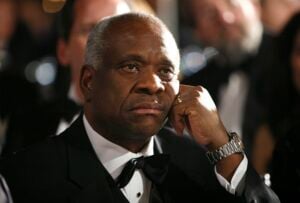

 Kathryn
Kathryn
 Olga
Olga

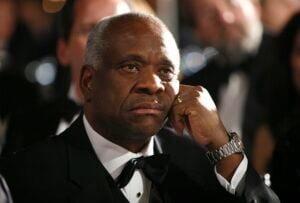
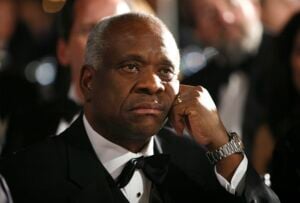
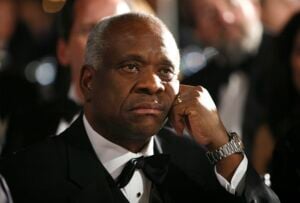
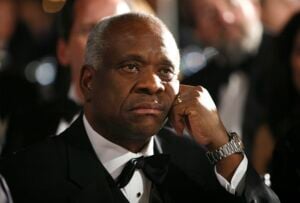

 Chris
Chris